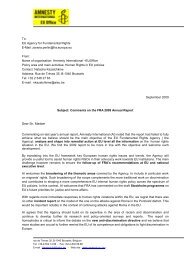Time for eULeX To prioriTize war crimes - Amnesty International ...
Time for eULeX To prioriTize war crimes - Amnesty International ...
Time for eULeX To prioriTize war crimes - Amnesty International ...
You also want an ePaper? Increase the reach of your titles
YUMPU automatically turns print PDFs into web optimized ePapers that Google loves.
1. INTRODUCTION<br />
Kosovo: <strong>Time</strong> <strong>for</strong> EULEX to prioritize <strong>war</strong> <strong>crimes</strong> 3<br />
In June 2012, the Council of the European Union will approve the extension of the mandate<br />
of the EU-led rule of law mission in Kosovo, (EULEX). In this report, <strong>Amnesty</strong> <strong>International</strong><br />
advocates that the new mandate should include specific measures to ensure that EULEX, as<br />
a matter of urgency, prioritizes the investigation and prosecution of <strong>crimes</strong> under<br />
international law, including <strong>war</strong> <strong>crimes</strong> and <strong>crimes</strong> against humanity.<br />
<strong>Amnesty</strong> <strong>International</strong> is a<strong>war</strong>e that over the next two years the EULEX mission will be<br />
reconfigured, and that the mission will down-size, and withdraw personnel from the police<br />
and customs sectors, leaving the mission to focus on the justice system. <strong>Amnesty</strong><br />
<strong>International</strong> considers that this is an ideal opportunity to strengthen both the international<br />
and local components of the justice sector, and in so doing, provide the resources and<br />
personnel needed to effectively address the persistent impunity which persists in Kosovo.<br />
Across the Balkans, impunity <strong>for</strong> <strong>war</strong> <strong>crimes</strong> remains one of the most serious human rights<br />
concerns. In Kosovo impunity persists <strong>for</strong> <strong>war</strong> <strong>crimes</strong> committed by both sides of the 1999<br />
armed conflict. Few of the Serb military, police and paramilitary <strong>for</strong>ces responsible <strong>for</strong> <strong>war</strong><br />
<strong>crimes</strong> against Kosovo Albanians have been brought to justice. However, even fewer members<br />
of the Kosovo Liberation Army (KLA), responsible <strong>for</strong> <strong>war</strong> <strong>crimes</strong> against Kosovo Serbs, Roma<br />
and members of other minority communities have been prosecuted and convicted.<br />
Despite the presence in Kosovo since 1999 of international police, and (since 2000) of<br />
international prosecutors and judges, charged with the investigation, prosecution and<br />
adjudication of <strong>war</strong> <strong>crimes</strong>, little progress was made by EULEX’s predecessor, the United<br />
Nations Interim Administration Mission in Kosovo (UNMIK).<br />
In January 2008 <strong>Amnesty</strong> <strong>International</strong> published a report, Kosovo (Serbia): The challenge to<br />
fix a failed UN justice mission, which described the failures of UNMIK’s international justice<br />
system in Kosovo. 1 This report demonstrated that UNMIK had failed to establish an effective<br />
and impartial justice system, with concrete reference to the investigation and prosecution of<br />
<strong>war</strong> <strong>crimes</strong>. That report made specific recommendations, “to any future EU mission or any<br />
other international body mandated to assist the government of Kosovo in ensuring the<br />
development of a fully functional prosecutorial and judicial system in Kosovo (irrespective of<br />
the <strong>for</strong>m of any agreement on the final status of Kosovo)”. These recommendations sought to<br />
ensure that the then-planned EULEX mission did not make the same mistakes as UNMIK.<br />
As this report illustrates, many of <strong>Amnesty</strong> <strong>International</strong>’s recommendations were indeed<br />
taken on board and put into practice by EULEX, although over the ensuing years, in several<br />
areas EULEX either failed to identify solutions or gradually fell back into UNMIK’s old ways.<br />
In this report, and bearing in mind the organization’s 2008 recommendations, <strong>Amnesty</strong><br />
<strong>International</strong> analyses the progress made by EULEX in the investigation and prosecution of<br />
<strong>war</strong> <strong>crimes</strong>. In the light of those findings the organization makes a series of new<br />
recommendations which aim to in<strong>for</strong>m decision-makers in EU member states and<br />
institutions, in advance of their extension of EULEX’s mandate.<br />
Index: EUR 70/004/2012 <strong>Amnesty</strong> <strong>International</strong> April 2012



